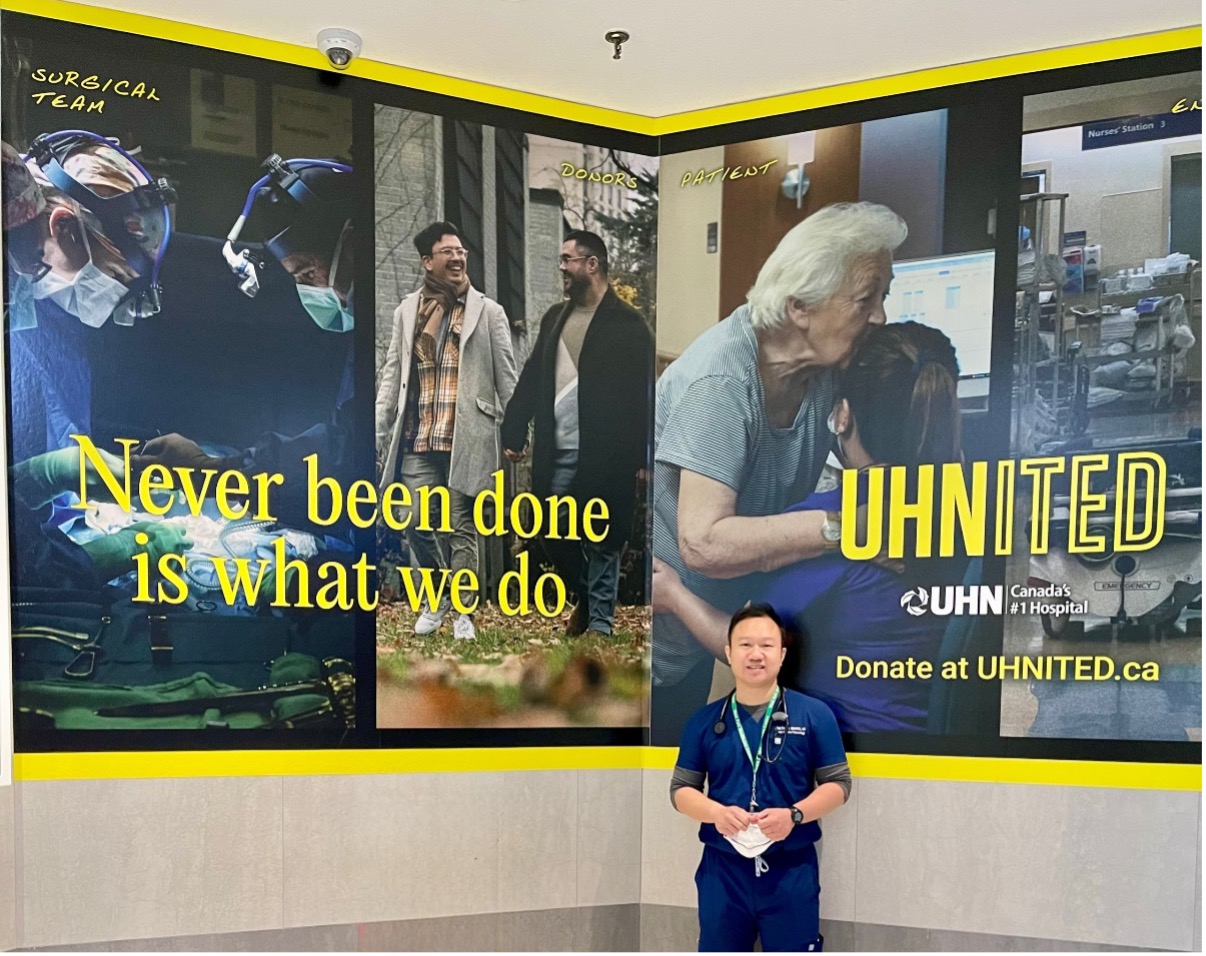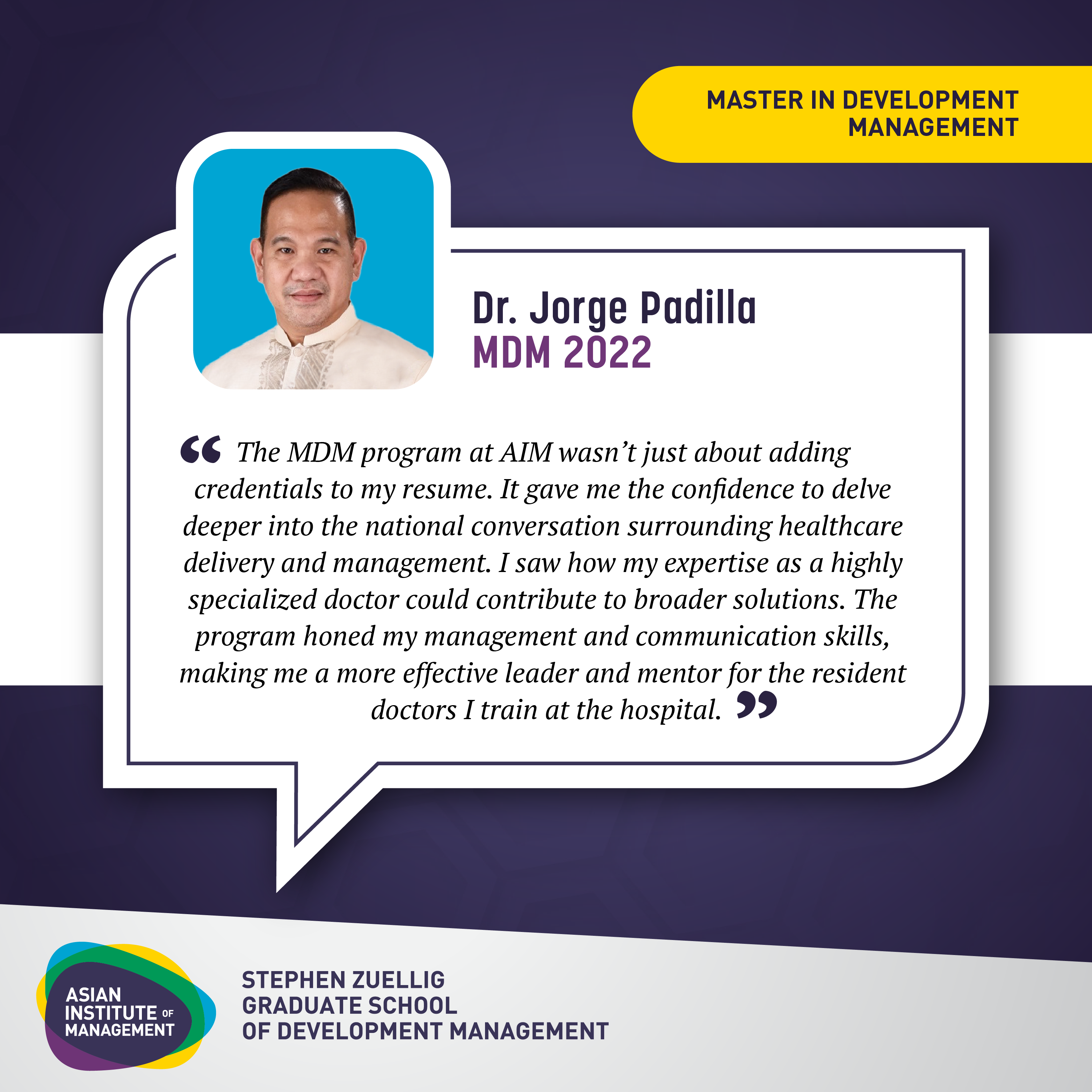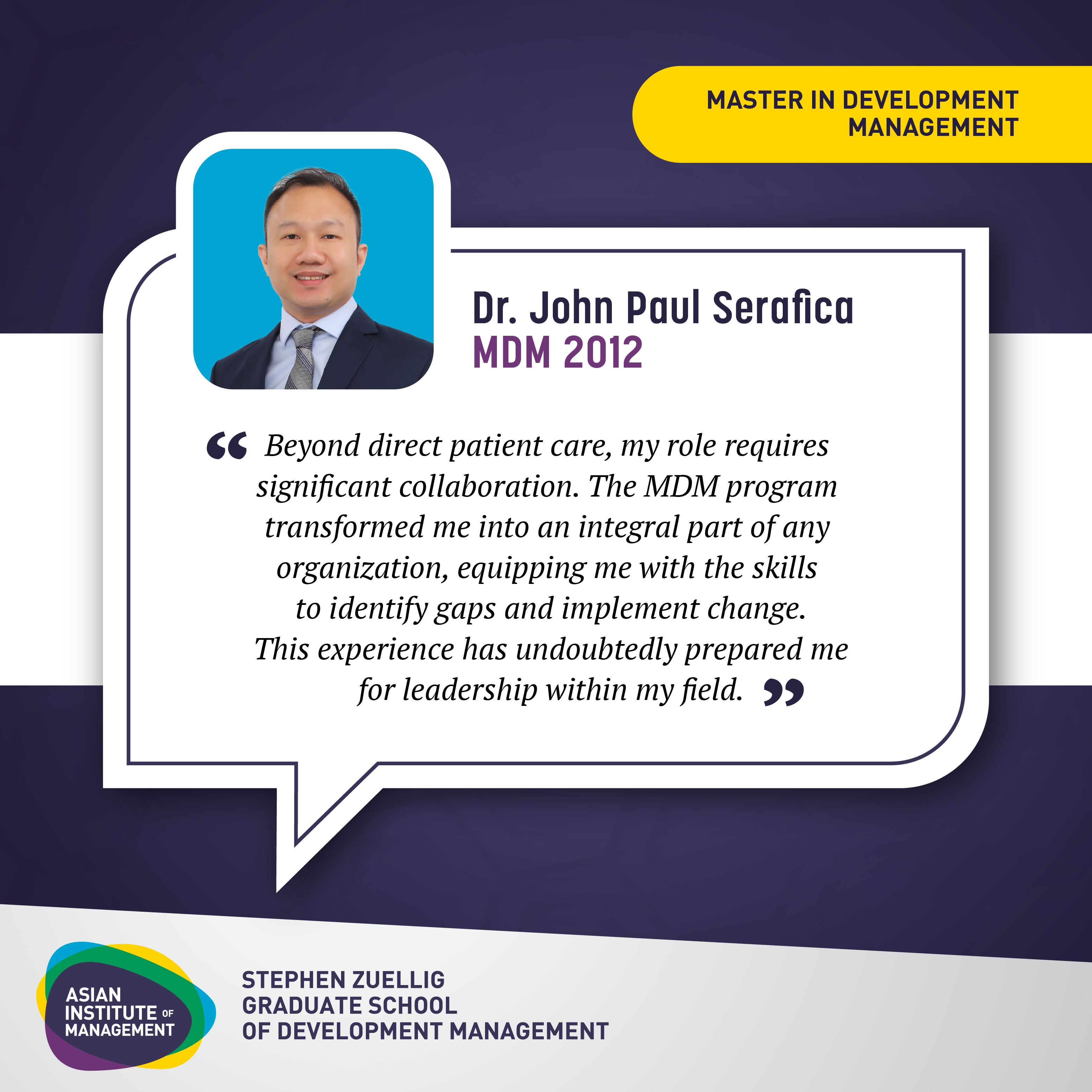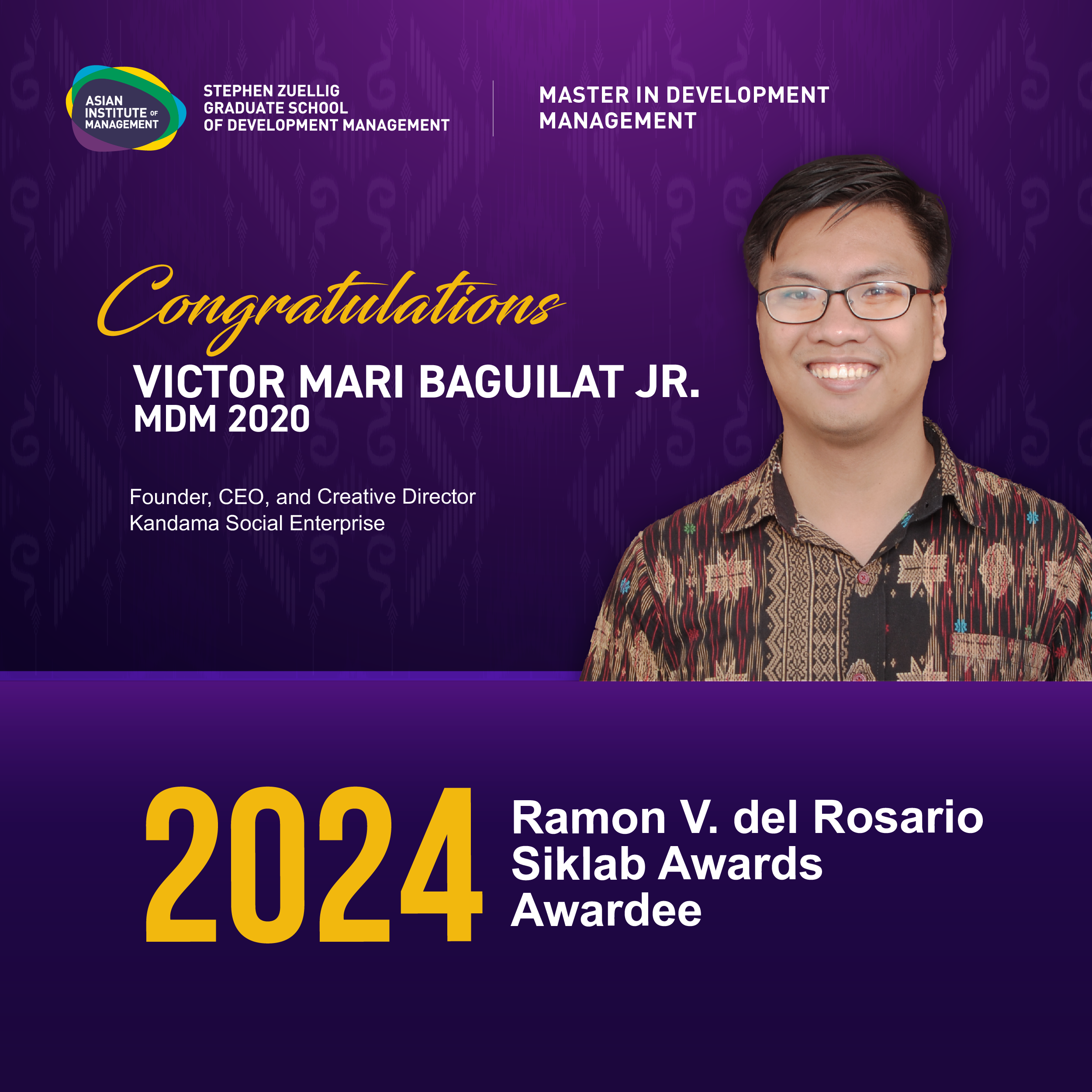White coat pressed, stethoscope around his neck—Dr. John Paul Serafica was the image of a successful medical professional. But there was more to him than met the eye. His desire for a broader impact led him on an unexpected path: a Master in Development Management (MDM) degree at the Asian Institute of Management (AIM).
His time at AIM proved to be a transformative experience. The MDM program exposed him to diverse social work approaches and brought him together with a global network of professionals from various backgrounds. Dr. Serafica emphasized that this exposure fostered a way of thinking that considers all viewpoints for collective success, “My time at AIM was one of the most fruitful experiences in my life. It exposed me to the diverse world of social work and brought me together with a global network of professionals from a wide range of backgrounds. This rich tapestry of perspectives underscored the importance of considering all viewpoints for achieving a common goal.”
The impact of the MDM program proved to be more than an academic pursuit; it was a pivotal experience for personal and professional growth. “Beyond direct patient care, my role requires significant collaboration. The MDM program transformed me into an integral part of any organization, equipping me with the skills to identify gaps and implement change. This experience has undoubtedly prepared me for leadership within my field,” Dr. Serafica added.
This leadership focus resonated deeply with Dr. Serafica, aligning perfectly with this year’s World Health Month theme of “My Health, My Right.” He recognized the crucial role of ensuring accessible, quality healthcare for all. This principle permeated his practice, where he ensured every patient received the best possible care, regardless of their financial situation. Dr. Serafica hoped this approach would inspire younger doctors and encourage them to prioritize patient well-being above all else.
The sense of community at AIM further enriched Dr. Serafica’s journey. The program fostered collaboration among students, particularly during their international team project in Vietnam. This experience not only deepened his understanding of the course material but also forged lasting friendships with his learning teammates. Even today, these bonds remain strong, with many classmates becoming his closest confidantes.
Meanwhile, for Dr. Jorge Padilla, a seasoned neurologist, the desire to make a lasting impact extended far beyond the confines of his clinic. His unwavering commitment to improving healthcare access and empowering communities led him to the Master in Development Management program. It was a new path fueled by his passion to make a difference.
 Surrounded by accomplished professionals, Dr. Padilla knew he was in for a challenge. The program’s dynamic curriculum, grounded in current trends and global standards, pushed him intellectually. Moreover, the diverse perspectives of professors, classmates, and teammates broadened his understanding of economics, politics, and most importantly, healthcare management. His newfound knowledge shed light on the systematic challenges plaguing healthcare and revealed opportunities to create a wider impact.
Surrounded by accomplished professionals, Dr. Padilla knew he was in for a challenge. The program’s dynamic curriculum, grounded in current trends and global standards, pushed him intellectually. Moreover, the diverse perspectives of professors, classmates, and teammates broadened his understanding of economics, politics, and most importantly, healthcare management. His newfound knowledge shed light on the systematic challenges plaguing healthcare and revealed opportunities to create a wider impact.
“The MDM program at AIM wasn’t just about adding credentials to my resume. It gave me the confidence to delve deeper into the national conversation surrounding healthcare delivery and management. I saw how my expertise as a highly specialized doctor could contribute to broader solutions. The program honed my management and communication skills, making me a more effective leader and mentor for the resident doctors I train at the hospital,” Dr. Padilla shared.
Akin to Dr. Serafica, the World Health Month’s theme also struck a chord with Dr. Padilla, reminding him of his time in Cotabato City. There, he saw a public healthcare system often reacting to trends, relying on inconsistent data. Dr. Padilla highlighted his advocacy and vision regarding healthcare equity saying, “This is where community immersion becomes crucial. We need to listen deeply and understand their aspirations and true needs, not just perceived ones. I would like to champion this because I believe that only then can we return to the planning stage, to utilize design thinking and systems thinking to create solutions. My vision is for communities to have access to the healthcare they deserve, not what someone else thinks they need. This is my theory of change. After all, it’s their health, their right, and I see myself as an agent to help them experience that right.”
AIM’s simulation exercises helped Dr. Padilla hone his critical thinking and collaborative skills, solidifying his confidence in fostering change. “Through the MDM program, we were involved in a project wherein we immersed ourselves in Barangay 128, Smokey Mountain. We met with residents and leaders, experiencing the challenges firsthand. Leveraging our diverse team backgrounds, my team and I developed a comprehensive “Basurero Daily Operation” strategy. The plan encompassed systematic garbage collection, solid waste segregation, and even a sustainable income generation program. Our teamwork paid off, winning the top prize in the Lopez Foundation Environment Challenge. When we received the grand prize from the foundation, it was a moment of immense pride. It also solidified my confidence, proving the program’s impact extended far beyond the walls of my clinic.”
More than personal growth, Dr. Serafica and Dr Padilla’s stories are powerful illustrations of how education through the MDM program can bridge the gap between diverse disciplines, fostering leaders who champion not only individual health but also collective well-being. Their journey from healers to healthcare advocates demonstrates the transformative impact we can have on ourselves and the communities we strive to serve.
The Master in Development Management program at the Asian Institute of Management is an intensive twelve-month program conducted by the Stephen Zuellig Graduate School of Development Management with the goal of honing future leaders in creating solutions and policies for the management of challenging development environments. After 32 years, the program was redesigned to address the demands of a rapidly changing world by educating its cohorts to scale social impact through social entrepreneurship, transformative policy implementation, and impact-first investing.








